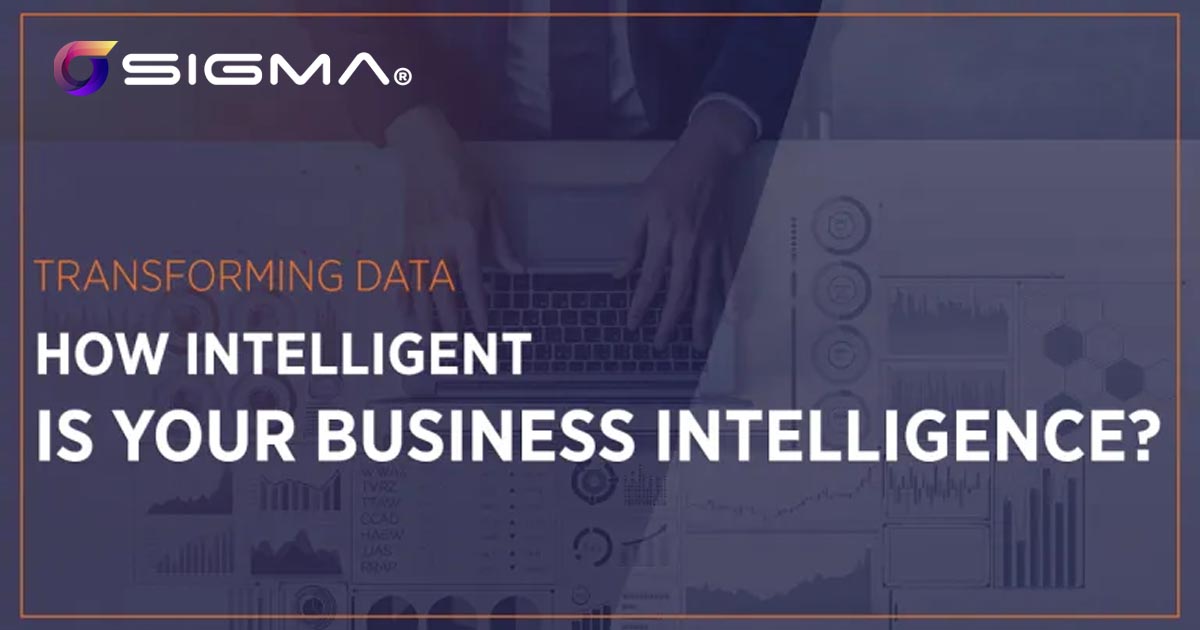
How Intelligent Is Your Business Intelligence?
This is the age of data. Data drives all manner of decisions, and we are all experiencing that heavily in businesses. Organizations making decisions not based on data are running the risk of being so far outstripped by the competition that they might find themselves on a very short path to obsolescence.
Many of us know how daunting the task of analyzing data to arrive at meaningful insights can be. Even a medium-sized organization generates massive amounts of data every day, which could cause the message to be lost in the noise. Businesses today are vying to find a way to harness the power of data generated from their operations to drive informed decisions.
How important is Business intelligence (BI)?
Sales trends, performance benchmarks, cost drivers, market conditions, customer behaviors, efficiency markers… these are all key metrics that businesses rely upon heavily when laying down strategy, devising tactics and action plans, and making decisions. It is also where they can make the best use of Business Intelligence.
Your business might generate data from a slew of tools including CRMs, ERPs, HRMSs, POSs, or LMSs. The data being generated from one, however, might not be mappable onto that generated from another. In fact, data generated from any source might not even be meaningful in and of itself. Each of us has probably experienced the epiphanous generation of insights several times in our business: did they arise from looking at data from a single source? Or, rather, from the correlation between data generated from different sources? Did it require further analyses, processing, and visualization into meaningful reports before it drove decisions?
Herein lies the power of BI.
BI in Action

Don’t throw your money down the drain
One business in the food and beverage industry was having trouble with the expiry of its products, which led to massive losses. Their focus on quality and freshness mandated the elimination of all fresh foods not sold at the end of the day. We’re talking about a huge business with thousands of stores all over the world; the cost of these products going to waste was astronomical!
In order to solve that problem, they made good use of a smart Business Intelligence platform. It allowed them to monitor their inventories of fresh food across their stores. When they find at midday that sales of perishable foods are not picking up, they send out free offers to customers via their phones, which entice them to come in, where they usually buy something extra. And even if that doesn’t work, the managers know near the end of the day to order a food truck to deliver unsold goods to charity, so that it at least goes to some use and doesn’t end up in a dumpster.
This business was able to cut down their losses by a whopping 40% after benefitting from applying Business Intelligence.
Under the Hood of BI Platforms… The Data Warehouse’s Inherent Flaws
Current Business Intelligence solutions rely on data warehouses to aggregate data from multiple disparate databases. And while this allows BI operations to be conducted, it does come at a cost. Data warehouses require a technical team to collect the data, create a model for its storage, and create the methods through which it will be presented. Furthermore, the structure of the data warehouse is fixed; any new data types that need collecting or reports that need to be produced require remodeling of the data warehouse yet again by the IT team, which is costly and takes time; time that could result in a loss of opportunities.
While data warehousing is the standard operating procedure for most BI platforms, is there any way to reduce the extra expenses brought about by having to create the data warehouse?
“Intelligent” Business Intelligence Platforms
Emerging players in the BI field depend on dynamic data modeling. Instead of hardcoding the database, the platform creates an interface between the original raw databases and the business people. Through customizable dashboards and querying, the platform lets end users retrieve the data, conduct the analysis, create the reports, and produce the visuals, all from a single application and with relative ease and almost no time. They are also flexible enough to be compatible with various ERP platforms that are already in use in many organizations.
These new platforms save you the time and effort of creating a data warehouse, and cut down the time spent in warehouse remodeling, so that new requests, queries, reports, and correlations, which used to take weeks to generate, can be created within minutes.

Business Intelligence is the Future
Today, with data being housed in multiple locations and maybe several different cloud solutions, it makes more sense to have BI tools that can tie between these different sources on the fly, and that are flexible enough to allow adding new sources of data and new ways of manipulating it, expediently and effortlessly.
As the need for accurate, actionable, and timely data increases, and as the vastness of the data itself being collected expands, businesses will need intelligent solutions to provide insights into their evolving markets in order to remain relevant and profitable. Any business operating without profound and clear-cut, data-driven insights might lose its edge to the competition.
